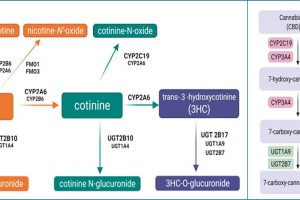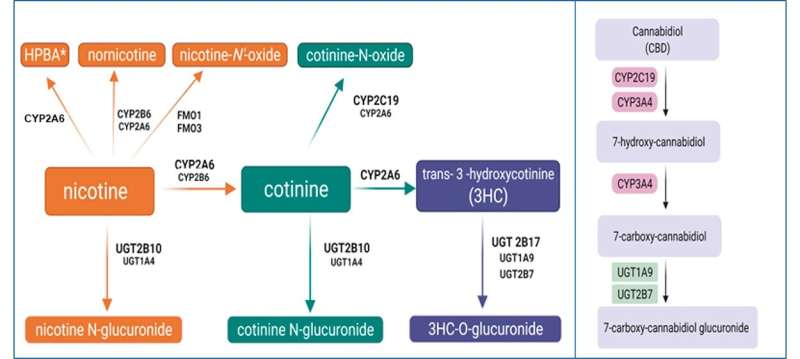CBD shows promise for reducing cigarette smoking


Cannabidiol or CBD, a non-psychoactive component of cannabis, inhibits the metabolism of nicotine, new research has found, meaning it could help tobacco users curb the urge for that next cigarette.
A team led by Washington State University researchers tested the effects of CBD and its major metabolite on human liver tissue and cell samples, showing that it inhibited a key enzyme for nicotine metabolism. For the nicotine-addicted, slowing metabolism of the drug could allow them to wait before feeling the need to inhale more of it along with all the other harmful things found in cigarette smoke.
More research is needed to confirm these effects in humans and determine dosage levels, but these findings show promise, said Philip Lazarus, WSU professor of pharmaceutical sciences.
“The whole mission is to decrease harm from smoking, which is not from the nicotine per se, but all the carcinogens and other chemicals that are in tobacco smoke,” said Lazarus, senior author on the study published in the journal Chemical Research in Toxicology. “If we can minimize that harm, it would be a great thing for human health.”
Cigarette smoking is still a major health problem with one in five people in the U.S. dying every year from smoking-related causes. While often seen as less harmful, many other nicotine delivery methods including vaping, snuff and chew also contain chemicals that can cause cancer and other illnesses.
In this study, the researchers tested CBD and its major metabolite, 7-hyroxycannabidiol, on microsomes from human liver tissue as well as on microsomes from specialized cell lines that allowed them to focus on individual enzymes related to nicotine metabolism.
They found that CBD inhibited several of these enzymes, including the major one for nicotine metabolism, identified as CYP2A6. Other research has found that more than 70% of nicotine is metabolized by this enzyme in the majority of tobacco users. The impact of CBD on this particular enzyme appeared quite strong, inhibiting its activity by 50% at relatively low CBD concentrations.
“In other words, it appears that you don’t need much CBD to see the effect,” said Lazarus.
Lazarus’ team is currently developing a clinical study to examine the effects of CBD on nicotine levels in smokers, measuring nicotine levels in their blood versus smokers taking a placebo over the course of six to eight hours. Then, they hope to do a much larger study looking at CBD and nicotine addiction.
More information:
Shamema Nasrin et al, Inhibition of Nicotine Metabolism by Cannabidiol (CBD) and 7-Hydroxycannabidiol (7-OH-CBD), Chemical Research in Toxicology (2023). DOI: 10.1021/acs.chemrestox.2c00259
Journal information:
Chemical Research in Toxicology
Source: Read Full Article